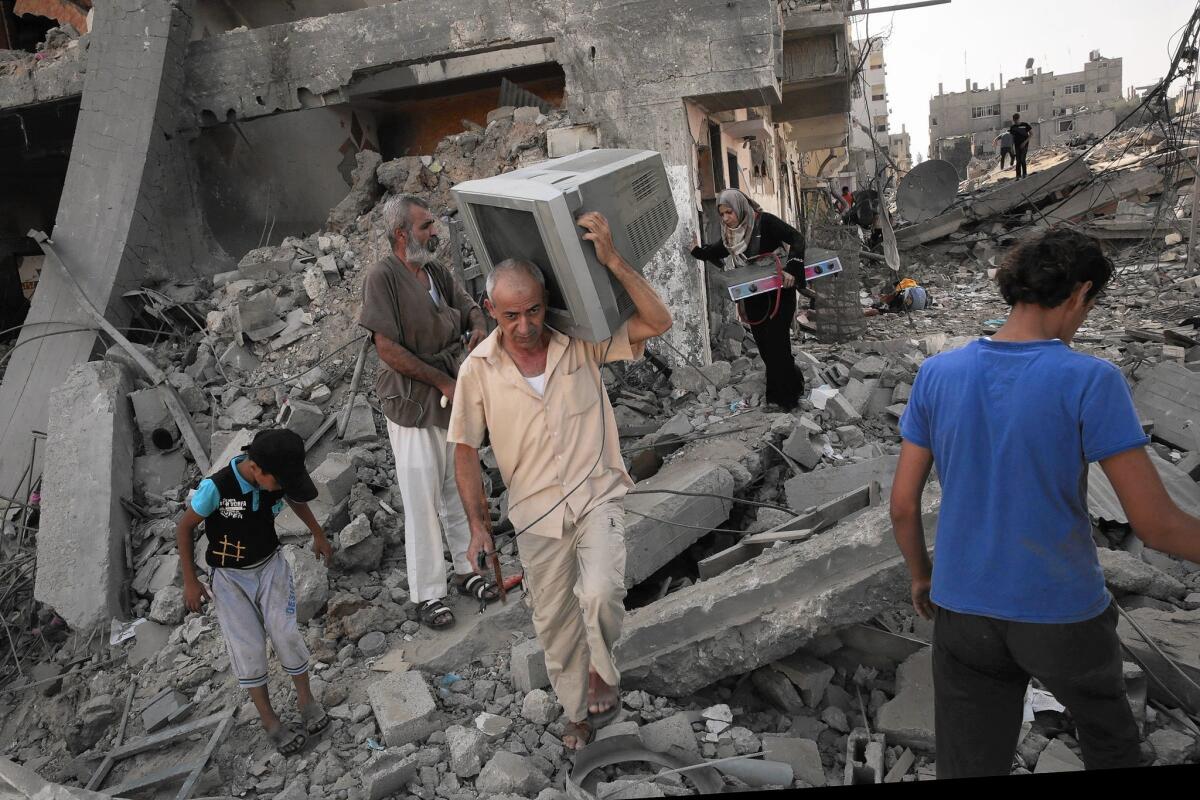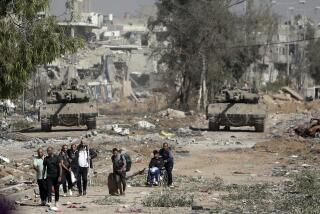Year in Review: Palestinians escalate campaign for sovereign statehood

After a disastrous 2014, Palestinians are embarking on a risky new gambit for 2015: seeking to internationalize the Middle East peace process.
After decades of American-led mediation efforts, the Palestinian leadership is moving aggressively to court world support for sovereign statehood, despite warnings from within and without that such a strategy could backfire and strengthen Israel’s hand.
Last year began amid a concerted U.S. campaign by Secretary of State John F. Kerry to coax Israel and the Palestinians to the bargaining table. By April, that high-profile peace bid had broken down amid bitter mutual recriminations.
By July, war had erupted in the Hamas-controlled Gaza Strip, a 50-day conflict that left large parts of the coastal enclave in ruins, and killed nearly 2,200 Palestinians, including more than 1,500 civilians, and more than 70 on the Israeli side, most of them soldiers.
Four months after a halt to the fighting, the reconstruction of Gaza has barely gotten off the ground, and Egyptian-brokered talks meant to forestall new hostilities are on hold. Gaza remains largely cut off from the world, bottled in by Israel and neighboring Egypt.
In the West Bank, Israeli settlement activity continued, and in Jerusalem, claimed by both sides as their capital, tension soared last year over a disputed holy site, spilling over into a series of deadly attacks.
Against this grim backdrop, however, many Palestinians believe that the hardships of the last year have generated a crucial advantage for them in the world arena. And they are determined to exploit that.
The Palestinian leadership has “made a calculated decision to try to score as many points in the diplomatic arena as possible, to be used against Israel,” said Ido Zelkovitz, a Middle Eastern historian at the University of Haifa, who also teaches at the University of Minnesota. “These pressures could grow…. Israel is beginning to lose international public opinion and support.”
Over the last several months, European governments have signaled growing impatience with the lack of progress toward Palestinian statehood. In October, Sweden became the first major European state to extend recognition to Palestine. In nonbinding but symbolically important votes, lawmakers in Britain, France and Ireland also voted in favor of recognition, and the European Parliament last month extended recognition in principle.
Israel tends to see European criticism as an irritant, often chalking it up to anti-Semitism, but the relationship with the United States is viewed as far more crucial. But Prime Minister Benjamin Netanyahu’s dealings with President Obama have deteriorated dramatically, and some American Jews were made uneasy by steps such as Netanyahu’s push to enact a “nation-state” measure that critics say emphasizes Israel’s Jewish character at the expense of its democratic one.
The year’s end brought a burst of frustration on the Palestinians’ part, a counterproductive one, in the view of many, but also a clear indication of commitment to putting their statehood cause on the international agenda.
“This effort is part of our political battle to liberate the land,” Palestinian Authority President Mahmoud Abbas said this week at a leadership meeting in the West Bank city of Ramallah after he brushed aside U.S. admonitions and orchestrated a United Nations Security Council vote Tuesday on a resolution that would set, among other things, a three-year deadline for an Israeli withdrawal from the West Bank.
The Palestinians failed to garner the nine necessary votes for passage, but fell only one vote short, and the Obama administration was forced to engage in a strenuous lobbying push for “no” votes and abstentions. Ally France broke with the U.S. to support the measure.
Samantha Power, the U.S. ambassador to the U.N., chided the Palestinians for a “staged confrontation” that would not help win statehood, but also pointedly cautioned Israel not to view the vote as “victory for an unsustainable status quo.”
With the clock ticking down on 2014, Abbas made another gesture with potentially explosive repercussions: He signed documents Wednesday in a bid to join the International Criminal Court, which would allow the Palestinian Authority to pursue war crimes charges against Israel. Experts said such a step would torpedo any prospective negotiations; a commentary in Israel’s left-leaning Haaretz newspaper called it Abbas’ “nuclear option.”
Regardless of whether the Palestinians attempt to bring cases against Israeli officials, the move seemed to bode ill for any semblance of compromise. Netanyahu warned that Palestinians were vulnerable to war crimes accusations. The State Department called the move to join the court deeply troubling, though without threatening, at this juncture, to curtail hundreds of millions of dollars in aid to the Palestinian Authority.
Many Palestinians fear that with Israeli elections set in March, a sense that the international community has turned on Israel will result in greater voter support for Netanyahu or those who take an even harder line than he does. Any new talks are probably on hold until after the election.
The prime minister’s main rivals paint the coming year as one in which Israel’s ability to make headway in the marketplace of world opinion will be vital. Those include centrist former foreign minister and peace negotiator Tzipi Livni, who has said she would rotate prime ministerial duties with political ally Isaac Herzog if they emerge victorious in the elections.
“Diplomatic battle is something Herzog and I know how to do,” she said. “Netanyahu does not.”
Twitter: @laurakingLAT
Special correspondent Sobelman reported from Jerusalem and Times staff writer King from Cairo. Special correspondent Maher Abukhater in Ramallah contributed to this report.
More to Read
Start your day right
Sign up for Essential California for news, features and recommendations from the L.A. Times and beyond in your inbox six days a week.
You may occasionally receive promotional content from the Los Angeles Times.






